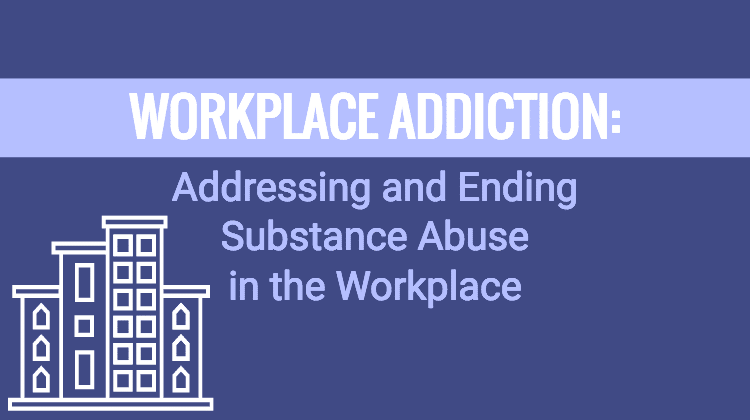
Jobs that are focused on manual labor are cited as some of the main industries where drug and alcohol abuse is prevalent. Some career paths, like the entertainment industry, and even jobs at the executive level, almost welcome drinking and drug use. Entertaining clients, long business trips, and access to large amounts of money all encourage drug and alcohol use. But many overlook the 9-5 office employees as potential drug or alcohol abusers.
The truth is, the stress and pressure of certain jobs causes many to abuse alcohol or drugs. Meeting deadlines, appeasing your boss, dealing with monotonous work, and the stress of the daily work environment are all reasons people use drugs and alcohol.
According to the National Institute on Drug Abuse, the cost of addiction in the United States exceeds 700 billion dollars annually through crime, lost work productivity, attendance problems, and health care costs.
There is no magic wand you can wave over your employees to solve all their problems, but there are ways to reduce the chances of workplace addiction in your office.
Actions for Preventing Workplace Addiction
As HR, the responsibility lies with you to develop a comprehensive substance abuse policy. Having your employees aware of the consequences of their actions is a great starting point.
Many companies have Employee Assistance Programs (EAPs) which help with providing resources for someone struggling with drug or alcohol abuse. If you already have a drug policy or EAP, you are already halfway there.
The challenge of ending workplace addiction lies in reducing stress as well as creating an open and positive work environment. Here are some ways you can promote a drug-free environment in your office.
1. Develop an Open Door Policy
Employees who know they can talk to you in confidence and that you will not judge them are more likely to come to you when problems are developing in their lives.
Life problems such as divorce, death, and financial issues are all reasons someone may drink or use drugs. Helping them cope with and get through life problems can go a long way in decreasing workplace addiction.
2. Promote a Less Stressful Workplace
If employees are meeting deadlines, have the resources they need, and do not feel like they are walking on eggshells to keep their jobs, they are less likely to have workplace stress.
3. Hold Workshops
Hold brief workshops with employees on coping with stress. During these workshops, you might want to think about introducing new holistic strategies like meditation, yoga, and exercise.
Talk with your employees about the energy of the work environment and listen to their ideas on how the office could run more smoothly and effectively. Letting your employees know that you care about their health and happiness both at the job and in life can result in more positive outcomes.
Addressing an Addicted Employee
Signs of addiction may vary depending on the substance people are abusing. Some addiction signs are more obvious than others, but it is important to approach with caution. If you suspect that one of your employees is struggling with drugs or alcohol, make notes of the suspicious activity and develop a case before meeting with the employee.
It is important to talk to the employee with an open dialogue. Let them know they are not fired if they admit they have a drug or alcohol problem. Because of the stigma associated with the disease of addiction, many avoid to ask for help or admit their problem.
If you are going to address an addicted employee, consider some of the following points.
1. Be Kind but Firm
Addiction is a sensitive subject, but it is not something to sweep under the rug. Kindly address the issues you have and tell them that you are there to help.
2. Be Aware of Denial
Addicts can disguise their drug or alcohol use, and denial and blaming are two tactics addicts use in hopes that the situation will blow over. It is important to treat addiction as a disease. In some cases the addiction can be so strong that the addict will avoid getting help at all costs.
3. Offer Solutions
Many rehabs today offer cell phone or Internet service, which can allow your employees to keep in touch with their jobs and their families while getting the help they need. There are many different types of rehabs and centers in many locations. If your employee cannot go away for treatment, outpatient programs might work as well.
Workplace addiction can cripple an office. If you have suspicions about an employee, do not hesitate to address the problem. Work with HR addiction resources to find rehabs and outpatient programs that work to address underlying issues as to why someone is using drugs or alcohol. Treatment can also give your employee new strategies to cope with their emotions and life issues.
When addiction strikes in your workplace, it is crucial to have an action plan to prevent the situation from getting worse.
About the Author
William Miko is a writer and researcher in the field of addiction recovery. William works as a content creator for a no-cost placement service that matches the right rehabs with the people who need help ending addictions — HR Addiction Resources. When not working, you might find him at your local your basketball court or having a conversation with anyone who will listen. He lives by the motto “Live for today, as tomorrow is not promised.”